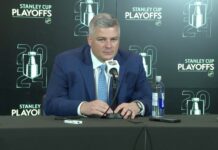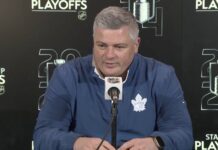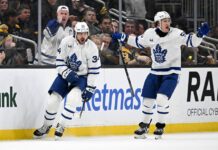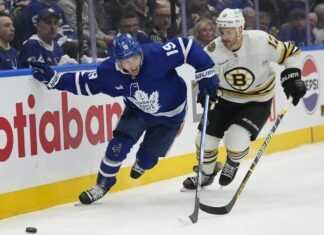 It’s been the story of the summer in Toronto, the one that just will not go away.
It’s been the story of the summer in Toronto, the one that just will not go away.
What will the Maple Leafs do with Tomas Kaberle? Will they trade him this offseason? Will they keep him hoping his play on an improved team will up the demand for him? Or will they keep him with the intention of building around him?
Most of the focus this offseason has been on trade possibilities, and understandably so. Kaberle is a rare commodity, a defender with an undeniable top-level skillset, signed for two more years to an extremely good dollar value ($4.25 million) for a defender of his ability.
Consider that since the lockout, Kaberle is tied for 5th overall in points by a defenseman, with only Lidstrom, Rafalski, Markov and Neidermayer ahead of him (tied with Gonchar). That’s some select company. Had it not been for the injuries last season, he could easily be 2nd overall — he is only 9 points shy of Rafalski — on that list.
While the knock on Kaberle has always been his lack of physicality, and his deficiencies in the defensive zone, there is little doubt that he ranks among the premier offensive defensemen in the NHL. Accordingly, Leafs‘ GM Brian Burke will accept no less in a trade scenario than what he sees fit as a return for a top defenseman in the league; a first round pick, top prospect, and roster player have long been rumoured to be his asking price.
With the Maple Leafs in a clear rebuilding mode, the summer has naturally been spent largely dissecting rumours of Kaberle’s next possible destination. Burke has made it clear on several occasions that he is not actively shopping his most talented offensive player — but like any GM worth his salt, he is willing to listen to any offers that could improve his team. After all, improving the team and building one that can win over the long haul is his job. He wouldn’t be very good at it if he weren’t willing to listen, and to consider any and all possibilities.
Teams know Kaberle’s contract status, and all about his NMC that has expired for a portion the offseason. They also know about his stated preference to remain in the East at the last trade deadline, when he was asked to submit a list of 10 teams for which he would be willing to waive the NMC. Teams are well aware that if they want to add Kaberle, now is their best chance as there is no guarantee he will waive at next year’s trade deadline. Western Conference teams in particular know that this offseason may be their only chance to land him; even if he waives at the trade deadline, there is little chance he will do so for a team based in the West (if last season is any indication).
Hence, most of the rumours that have arisen this summer have involved Western Conference teams. In particular, Columbus, St Louis, Vancouver, and Los Angeles have been most consistently discussed, due to (a) each team’s need for a top offensive defenseman; (b) playoff pressure, either to make it to the post-season (LA) or find greater playoff success (Clb, StL, Van), and (c) each of those teams’ respective depth of top quality prospects and/or young roster players.
But to date, no deal has happened, despite plenty of talk. And teams have talked to the Leafs about Kaberle, that much is known. However, when a rumour is reported, rarely is it because somebody has leaked information that a deal is about to be brokered. Rather, information begins to circulate, out of both cities, that Team X and Team Y held discussions and this player or that player’s name came up. Talk does not equate to a deal; it equates to two teams feeling out their options, and looking to find a fit that suits both their immediate and long-term goals.
There are two sides to every deal, and just because one side wants a certain player from the other team doesn’t make for a deal. It’s a two way street, and has to make sense for both sides (be it from a depth perspective, a talent perspective, or a salary cap perspective — usually all three). This is the reason deals often take such a long time to consummate; the ones that are made in haste are usually the ones that tend to backfire or cost a team far too dearly in the long run. Philadelphia betting the farm on Chris Pronger, and the subsequent salary cap issues they will face for the better part of the next decade (which could ultimately force them to blow up the team), is a good example of this.
In a typical deal, some 15-20 varying proposals will fly back and forth between teams before something is agreed upon … for the exact reason of avoiding the kind of mess that a snap decision such as the Flyers’ draft-day acquisition of Pronger can inflict upon a team.
All this is to say that if Kaberle is to be traded, it won’t be because Burke feels he has to move him. He knows the value of his player, and he will continue to hold onto him until he receives an offer that suits his demands and convinces him will make the team better in the long run. The hope is for the hours leading up to the NMC deadline of August 15th to generate the sort of competitive interest usually reserved for the trade deadline, where teams will take their last shot at landing him, increasing their offers so as to guarantee they can acquire an All-Star calibre defender before one of their competitors does.
But, if that does not happen, is it really a bad thing? While we would all love to have an additional 1st rounder, and a top prospect around whom a team can be built, it must be said that top offensive defensemen are not exactly easy to come by. If Kaberle remains with the Maple Leafs, the team still has something that many teams do not: a bonafide, top-pairing, All-Star calibre offensive threat from the blueline. That, in and of itself, is not a bad thing at all … especially considering the new additions to the defensive unit. The additional stay-at-home skill should allow Kaberle to freelance with the puck even more, and should also (more importantly) better compensate for his defensive shortcomings than did last season’s unit.
In other words, Brian Burke has found himself in the ever-elusive, most enviabe win-win situation. Few GMs are ever so fortunate. Burke has the ability to move Kaberle, but not the necessity. If a team wants to step up and offer Burke what he feels Kaberle is worth, he will pull the trigger. But only if the deal is one that will make the team better. And if not, he still has an All-Star defenseman on his roster, signed for two more years to an outstanding contract. It’s a great situation, and one that surely has him laughing all the way to the bank. Move the player, and put in place the future of the team. Keep him, and the team has one of the top offensive blueliners in the game in place at an absolute steal of a deal … especially considering that Kaberle wants to remain in Toronto.
Regardless of what Burke says to the media (and I don’t know why anyone would ever take a GM’s words to the media as gold in the first place), this issue is far from black and white. Burke will tell the media he thinks Kaberle is going to be on the Leafs’ roster come training camp, and when he does so he is not lying … but that statement doesn’t actually mean he isn’t considering trading Tomas Kaberle either.
Statement:
(Paraphrase) I anticipate Tomas Kaberle will be on our roster when we begin training camp.
Translation:
We are not actively shopping Tomas Kaberle, and would love for him to remain on our team. However, if a team makes an offer for him that could be essential to turning our franchise into a winner, we would not be doing our jobs if we did not consider the offer.
And that is exactly where things stand now. The situation is no different than it was when Kaberle’s NMC was temporarily lifted at the beginning of the offseason. He is not being actively shopped, but expressions of interest from other teams are being entertained. A good GM will look at all offers, and take all expressions of interest seriously; it is the job of a GM to make his team better and all avenues and opportunities toward achieving that goal must be considered.
And so, the rumours will continue to circulate until Kaberle’s NMC kicks back in a week from today. If he is traded, it will only happen if the return is of the sort of calibre that the Leafs’ brass feels will contribute to a winning team, not just in the next few years but from a long-term perspective, also. And if such an offer does not get made, Kaberle will begin the season with the Maple Leafs and we will go through all of this again at the trade deadline. Such is the nature of the beast.
For my part, I put the odds of Kaberle being traded at about 60/40. I do believe there is significant interest in his services, and that many teams feel he could be the missing piece to either making the playoffs, or making a playoff run. However, with all sides looking to find the best possible deal for their teams (Burke wants a large return, teams interested in Kaberle want to avoid giving up as much as possible), it stands to reason that if any deal is bound to happen, it is most likely to occur in the final days — perhaps final hours — before Kaberle’s NMC applies once more.
And, as I have stated above, if it does not happen by August 15th, the worst thing to come of that will be the fact that we will have to go through all of this again at the trade deadline. Don’t begrudge Burke if a deal is not made; he has identified the value he is seeking in any possible trade for Kaberle, but has also stated he would be quite happy to see him line up on the Leafs’ blueline when the season gets underway in October. Remember that even if no trade can be made, the team still has something enviable in Tomas Kaberle: one of the top point-producing defensemen in the game today, a player who will continue to be an offensive force for the better part of the next decade.
At the end of the day, no matter what ultimately happens with Tomas Kaberle, whether he is traded or remains with the team, it is a win-win situation for the Toronto Maple Leafs. I can live with that.


![Jim Montgomery Post Game, Bruins 4 vs. Leafs 2: “[Marchand] still manages to get under people’s skin, yet he doesn’t cross the line” Jim Montgomery, Boston Bruins post game](https://mapleleafshotstove.com/wp-content/uploads/2024/04/jim-monty-pg-to-218x150.jpg)























![Jim Montgomery Post Game, Bruins 4 vs. Leafs 2: “[Marchand] still manages to get under people’s skin, yet he doesn’t cross the line” Jim Montgomery, Boston Bruins post game](https://mapleleafshotstove.com/wp-content/uploads/2024/04/jim-monty-pg-to-100x70.jpg)







